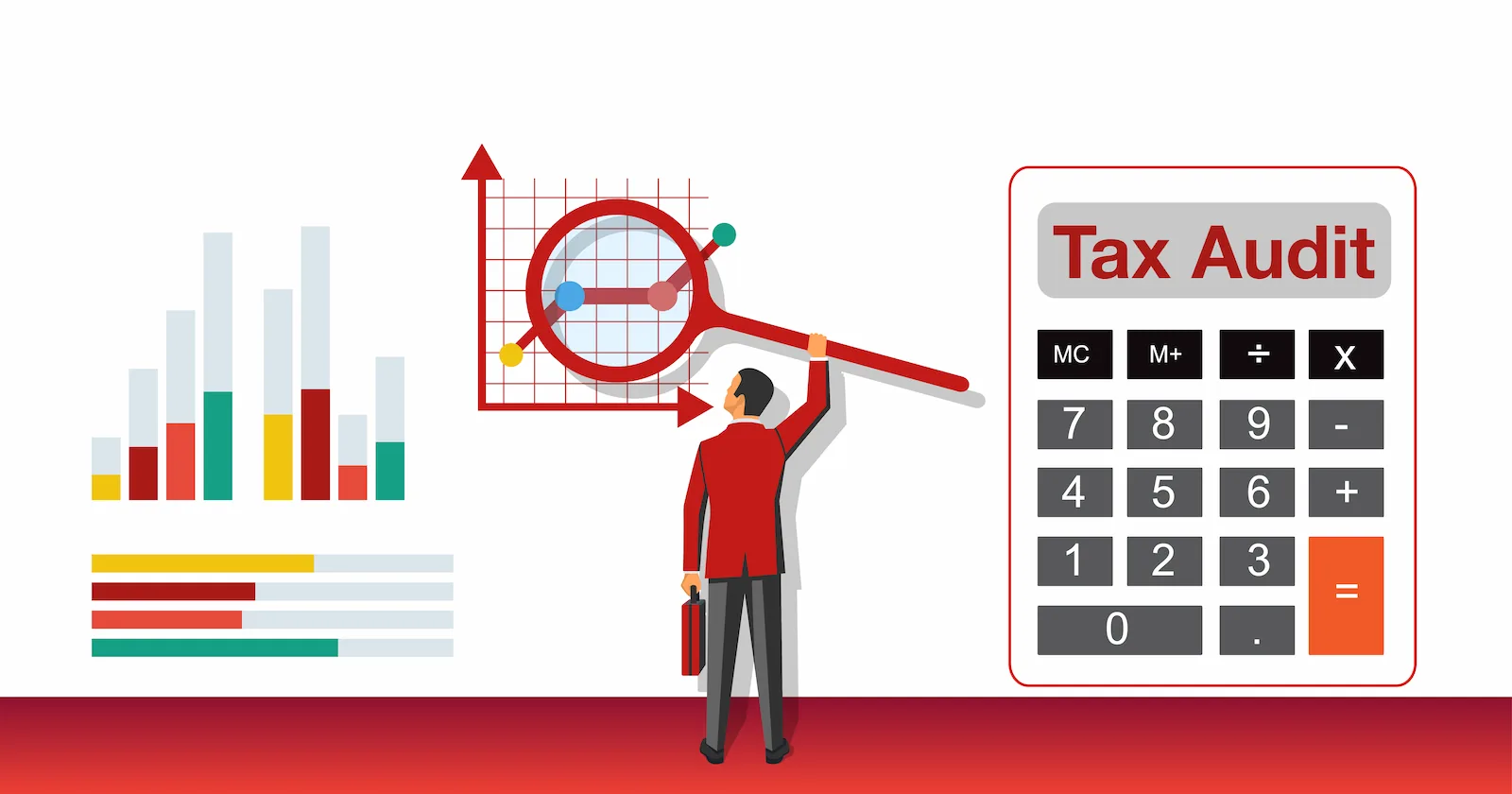What is a tax audit?
The term ‘audit’ refers to a check, review, verification or inspection of a record, transaction, account etc. A tax audit is the process of verification and inspection of the accounts of a taxpayer to confirm their adherence to the provisions of the Income Tax law.
Section 44AB of the Income Tax Act, 1961 deals with the Audit of the Accounts of a certain category of persons carrying on a business or engaged in a profession. The class of taxpayers listed under this section compulsorily have to get their accounts audited by a Chartered Accountant. The CA will check and verify that these accounts comply with the various provisions of the Income Tax law. Simply put, the audit that is required as per Section 44AB of the Income Tax Act, 1961 is called a tax audit.
The outcome of the audit is an audit report. This report is drawn by the Chartered Accountant where he or she gives his findings and observations about the compliance of the person under audit.
What is the purpose of a tax audit?
The purpose of conducting a tax audit is to achieve the following objectives:
- Maintain and ensure the accuracy of books of accounts, and have them certified by a tax auditor
- The purpose of reporting prescribed information is to ensure that you follow the various provisions of income tax law.
- Moreover, tax audits also ensure that the records reflect the actual income of the taxpayer and that the claims for deductions made are accurate.
Who is subject to a tax audit?
Tax audits are required if a taxpayer's sales, turnover, or gross earnings are more than ₹ 1 Crore in a given financial year. A taxpayer may, however, be required to get their accounts audited in certain other circumstances. The following categories of taxpayers that must participate in a tax audit:
Updates in the Above Provision
Finance Act 2020
For tax audits, the threshold limit of ₹1 Crore turnover is proposed to be raised to ₹5 Crore with effect from AY 2020-21 (FY 2019-20) if:
- the taxpayer’s cash receipts are limited to 5% of the gross earnings or turnover.
and
- the taxpayer’s cash payments are limited to 5% of the aggregate payments.
Finance Act 2021
In cases where the cash transactions do not exceed 5% of the total transactions - the threshold has been increased from Rs 5 crore to Rs 10 crore (with effect from 1st April 2021)
The following persons are compulsorily required to get their accounts audited.
In the case of Professionals:
- In case of a profession or professionals, tax audit would be required if gross earnings in the profession are more than Rs. 50 lakhs during the financial year. A profession or professional could be any of the following as per Rule 6F of the Income Tax Rules, 1962:
- Accountant
- Architect
- Interior Decorator
- Authorised representative
- Film Artist – Actor, Editor, Director, Music Director, Cameraman, etc.
- Engineer
- Legal Professional – Advocate or Lawyer
- Technical Consultant
- Medical Professional – Doctor, Physiotherapist, or Nursing and Paramedical Staff
- If you carry on a profession eligible for presumptive taxation (Section 44ADA) and you have claimed that your profits were lower than the stipulated limit, and income is more than the maximum amount up till which income tax isn’t chargeable.
In the Case of Business/ People Carrying on a Business:
- Carrying on business (not opting for presumptive taxation scheme*)
- If your turnover or gross earnings are more than ₹1 crore.
- If cash transactions are up to 5% of total gross receipts and payments, the threshold limit of turnover for tax audit is increased to Rs.10 crores (w.e.f. FY 2020-21)
- If you are running a business which is eligible for presumptive taxation (Section 44AE, 44BB or 44BBB) and
- you claim that profits or gains are lower than the stipulated limit, then an audit is necessary.
- If your business is qualified for presumptive taxation as per Section 44AD of the Income Tax Act and you declare that the taxable income has been below the limits specified as per the presumptive taxation scheme and your income is more than the Basic threshold limit
- Carrying on the business and is not eligible to claim presumptive taxation under Section 44AD due to opting out for presumptive taxation in any one financial year of the lock-in period i.e. 5 consecutive years from when the presumptive tax scheme was opted and if income exceeds the maximum amount not chargeable to tax in the subsequent 5 consecutive tax years from the financial year when the presumptive taxation was not opted for
- Carrying on business which is declaring profits as per presumptive taxation scheme under Section 44AD and if income exceeds the maximum amount not chargeable to tax in the subsequent 5 consecutive tax years from the financial year when the presumptive taxation was not opted for.
- Carrying on business which is declaring profits as per presumptive taxation scheme under Section 44AD and if your turnover or gross receipts exceed ₹2 crores in the financial year.
In the case Taxpayer who has suffered a Business Loss:
- In case of loss from carrying on of business and not opting for presumptive taxation scheme and you claim a total sales or turnover or gross earnings of more than Rs 1 crore.
- If taxpayer’s total income is more than basic threshold limit but he has incurred a loss from carrying on a business (not opting for presumptive taxation scheme) and in the case of loss from business when sales or turnover or gross earning is more than 1 crore, the taxpayer is subject to tax audit under 44AB.
- Carrying on business (presumptive taxation scheme under section 44AD applicable) and having a business loss but with income exceeding basic threshold limit and declares taxable income below the limits prescribed under the presumptive tax scheme and has income exceeding the basic threshold limit.
Statutory Audit Vs. Tax Audit
Under various legislations, including the Companies Act and Societies Registration Act, the entity may face the requirement to undergo an audit of books of account. In case the taxpayers is already facing a statutory obligation to get the accounts audited under a law other than the Income Tax Act, then, in such cases, there is no need to once again undergo another audit to satisfy the requirement for audit under the Income Tax Act. Hence, it shall be considered sufficient if the taxpayer’s books of accounts are audited under the other law mandating audit. However, the audit under the other law should be completed before the due date of filing the return. The taxpayer can furnish a prescribed audit report under Income tax law stating that since the accounts have been audited already in accordance with the requirements of another law, an audit under the Income Tax Act is not necessary.
Who will audit the books of accounts as per tax audit provisions?
A Chartered Accountant or a firm of chartered accountants conduct the audit as per tax audit provisions. An individual can conduct only 60 audits in a financial year. In the case of a partnership, this limit applies to each member of the partnership firm being a chartered accountant.
How to do a tax audit?
A taxpayer must file the tax audit report in a prescribed form.
Income Tax Audit Report Format
The format is prescribed by the income tax department. The following are the types of tax audit report along with their applicability:
- Form No. 3CA – This form applies to a taxpayer carrying on business or profession and who needs to get his books of accounts audited under any other law.
- Form No. 3CB – This form applies to a taxpayer carrying on business or profession and who is NOT required to get his books of accounts audited under any other law.
- Form No. 3CD – This form is best viewed as a detailed statement of particulars. It comprises various details of the business and its transactions.
- Form No. 3CE – This form is for NRIs and foreign companies. They are required to get their accounts audited if they receive fees/royalty from any Indian concern or the government for the rendering of technical services.
However, in either of the cases, the taxpayer must furnish Form No. 3CD along with Form No. 3CA or Form No. 3CB as applicable.
Tax Audit Report Filing Process
The following is the step-by-step procedure for filing the report:
- The chartered accountant will file the tax audit report online using his/ her own login credentials. The chartered accountant must be an individual assigned to conduct the audit of the individual or organization.
- The taxpayer must mention the details of the chartered accountant in their platform
- When the audit report gets uploaded by the chartered accountant. The taxpayer has the option to either accept or reject the report. In case the taxpayer rejects the report, the entire process will start over again.
What is the due date of filing a tax audit report?
The due date of filing the report depends on the due date of filing the income tax return. The taxpayer must file the report on or before the due date of filing the income tax return.
- The due date of filing of audit report i.e. Form 3CA or Form 3CB along with Form 3CD for taxpayers liable for audit under the Income Tax Act is 30th September of the relevant assessment year
- The due date of Submission of audit report for AY 2022-23 for taxpayers having transfer pricing and specified domestic transactions i.e. Form 3CE is 31st October 2022.
These due dates must be followed unless otherwise extended.
Suggested Read: Income tax return due dates.
Penalty for failure to Comply to Tax Audit Provisions u/s 44AB
A taxpayer who fails to comply with tax audit provisions will have to pay the applicable penalty. The penalty as per Section 271B of the Income Tax Act will be least of the following:
- Rs 1,50,000
- 5% of the total sales, turnover, or gross receipts
Example
Mr. Amit is carrying on a business and is liable for a tax audit. His total sales in the financial year are Rs 4 crores. He fails to get his books of account audited as per section 44AB.
The penalty will be least of the following:
- Rs 1,50,000
- 5% of the total sales. Rs 4 crore * 0.5% = Rs 2,00,000
Here the penalty will be Rs 1,50,000.
However, the income tax department waives off the penalty where the taxpayer shows a reasonable cause for non-compliance. The following are a few of the reasonable reasons for which penalty waiver is applicable:
- Delay caused by the resignation of the tax auditor
- Delay caused by death or physical inability of the partner responsible for accounts
- Natural calamities
- Delay caused by labour issues such as strikes or lock-outs
- Delay caused by loss of accounts due to theft or fire, or incidents that are not under the taxpayer’s control
How to reduce tax liability as a business owner or professional?
Here are a few ways to reduce tax liability as a business owner or professional:
- File your taxes on or before the due date. Apart from ensuring that you are a law-abiding entity, this tip for filing taxes also helps you in other ways. This is because you can carry forward a loss from your business for up to 8 consecutive years.
- Stay abreast of the changes instated by the government. The government revises the policies from time to time to help businesses, especially small and medium enterprises. Familiarising yourself with these changes will ensure that you are making the most of every deduction possible to lower your taxable income.
- Make the most of start-up expenses. Also known as preliminary expenses, these give you tax benefits under Section 35D of the Income Tax Act. Typically comprising expenses that you incur before the commencement of your business, these can be written off over five consecutive years as per the provisions of the law.
- So, keep pointers in mind to reduce your tax liability and carry out your tax audit on time. Remember that if you don't, you will have a penalty of up to Rs 1,50,000 to pay.
—
In order to get expert advice on legal ways to save taxes feel free to connect with a trusted financial advisor right away!





Comments
T